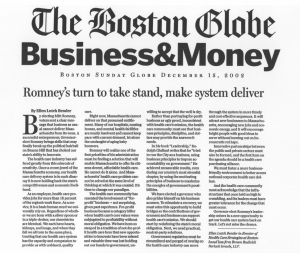Romney’s turn to take stand, make system deliver
 By electing Mitt Romney, voters sent a clear message that business as usual cannot deliver Massachusetts from its woes. A successful entrepreneur, Governor-elect Romney brings skills that may finally break up the political hairball on Beacon Hill that has choked our state’s ability to innovate.
By electing Mitt Romney, voters sent a clear message that business as usual cannot deliver Massachusetts from its woes. A successful entrepreneur, Governor-elect Romney brings skills that may finally break up the political hairball on Beacon Hill that has choked our state’s ability to innovate.
The health care industry has suffered greatly from this sclerosis of creativity. Once a crown jewel of the Massachusetts economy, our health care delivery system is in such disarray it is now holding back the state’s competitiveness and economic livelihood.
As an employer, health care provides jobs for more than 15 percent of the region’s work force. As a service, it is a basic human need we universally rely on. Regardless of whether we are born with a silver spoon or in a triple-decker, our chemistries are identical. We each have hearts, kidneys, and lungs, and when they fail we all turn to the same place, trusting that our health care system has the capacity and compassion to provide us with unbiased, quality care.
Right now, Massachusetts cannot deliver on that presumed entitlement. Many of our hospitals, nursing homes, and mental health facilities are nearly insolvent and cannot keep pace with current demand, let alone the onslaught of aging baby boomers.
Romney will realize one of the first priorities of his administration must be finding a solution that will enable Massachusetts to offer its citizens decent, affordable health care. He cannot do it alone. And Massachusetts’ health care problem cannot be solved at the same level of thinking at which it was created. It’s time to change our paradigm.
The health care community has resented the involvement of “for-profit” business–not surprising, given past experience. For-profit business became a category killer when health care’s core values were subjugated to profitability without moral obligation. We have been so steeped in a tradition of not-for-profit health care here that new opportunities to innovate have been missed and valuable time was lost holding out our hands to government, unwilling to accept that the well is dry.
Rather than portraying for-profit business as ugly greed, inconsistent with health care’s mission, the health care community must see that business principles, discipline, and dollars may provide the answers it needs.
In his book “Leadership,” Rudolph Giuliani writes that he “tried to run the City as a business, using business principles to impose accountability on government.” He achieved measurable results, even during our country’s most stressful chapter, by using the motivating principles of business to maximize the energies of government’s possibilities.
We have elected a governor who also prides himself on his business acumen. To stimulate a recovery, we must seize this opportunity to build bridges so the contributions of government and business can support health care’s mission. We should start by redefining the state’s moral obligation. Next, we need practical, neutral-party solutions.
Government regulation must be streamlined and purged of overlap so the health care industry can move through the system in more timely and cost-effective sequences. It will attract new businesses to Massachusetts, encouraging new jobs and economic energy, and it will encourage bright people with good ideas to serve without burning out on bureaucratic red tape.
Innovative partnerships between the public and private sectors must also be formed, and the first item on the agenda should be a health care purchasing alliance.
We must foster a more business-friendly environment to better access national corporate health care dollars. And the health care community must acknowledge that the infrastructure that once held us high is crumbling, and its leaders must have greater tolerance for the change that must occur.
Governor-elect Romney’s leadership ushers in a new opportunity to get our health care system back on track. Let’s not miss the chance.

